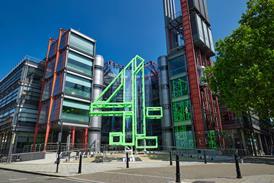It’s been a good year for larger post houses that can take on the biggest shows, but rising costs and a fall in TV ad spend have hit some smaller facilities hard. Ann-Marie Corvin reports
Despite the harsh economic climate, 2012 has been a pretty good year for facilities of a certain size. Leading the way is Envy, which, in the seven years it has been running, has amassed a total of five central London sites. In the past year alone, Envy – run by husband-and wife team Dave and Natascha Cadle – has doubled its capacity, with new buildings in Holden House and Windmill Street.
The latter site has been primed to house big light-ent vehicles such as BBC talent extravaganza The Voice UK, a genre that Dave Cadle argues has not been well catered for, until now. “There seem to be fewer places in post that can handle projects of a certain size like The Voice, which put pressure on capacity,” he notes.
Winning strategy
Envy’s strategy – to operate as a large company that deals with a huge volume of work – appears to have insulated it against some of the day-to-day operational challenges facing mid-sized companies such as Editworks, which closed its doors in the summer.
Editworks vice-chairman and cofounder Graham Hutchings attributed its struggles not to a lack of business – indeed, the facility closed with a full order book – but to a rise in the costs associated with running a company in the West End, with local authority charges and other costs rising at a prohibitive rate.
The fortunes of all post facilities are closely matched by those of the production client bases they serve, and one of the more positive knock-on effects in long form has been a surge in international TV work. Companies such as Firecracker, Nutopia, Shine and Raw continue their assault on the US and international markets.
Prime Focus UK’s VFX department was kept busy working on Nutopia’s Mankind: The Story Of All Of Us for US channel History, while digital specialist JCA has benefited from new client Shine International, which recently relocated its HQ from LA to London.
According to JCA managing director Simon Kay, the facility has also taken steps towards marketing itself abroad by forming a partnership with LA-based integrated media management services provider SMV Complete Media Solutions. Kay says: “What we have worked on is our partnership plan, building up with like-minded facilities from around the world to provide a global offer.”
He adds that the intention is to forge similar alliances with companies across Europe, Australia, the Far East and the East Coast of America.
It’s not all been plain sailing, however. The TV ad slump, which some have linked to the Olympics, hit commercials post-production, while the recession has affected all areas of the market: Deluxe, Prime Focus and Sumners all reported job losses. Midsized facility The Mews, meanwhile, cut back rapidly to a single site in Covent Garden.
A couple of facilities were fortunate enough to bounce back from near closure – with the right backing. Since production/distribution giant DCD came to Sequence’s rescue last Christmas, the facility appears to have turned around its fortunes.
The company’s managing director Ben Foakes describes business as “vibrantly busy” in the nine months since its relaunch. “This year has seen our best performance, strongest order book and highest revenues since the inception of the company in 2004,” he adds.
Film financier Steve Milne, meanwhile, threw his old facility Molinare a lifeline in June after it was put into administration by owner Century Communications.
With Molinare posting losses of £1.5m in 2011, Milne – who now assumes the role of chairman – and Molinare’s newly appointed managing director Julie Parmenter face the challenge of turning around the facility’s fortunes in the year ahead.
It is significant that both Molinare’s Parmenter, a former executive at Rolls Royce, and the new Prime Focus chief executive Bernard Kumeta – a seasoned chief executive/chartered accountant – hail from other industries.
Rowan Bray, who has been Prime Focus’s managing director for more than a year, believes these new hires bring in people with high-level business skills and experience – over and above the strong sales, marketing and technical talent that most facilities already possess. Despite some redundancies on the commercials side this year, Bray says, for Prime Focus, business has been “consistently better than last”.
Prime Focus’s multimillion-pound three-year contract with Red Bee’s creative services department has certainly given it a much-needed boost, with its ability to offer extra capacity a key factor. This gives Red Bee the option of using Prime Focus’s Soho sites as well as Red Bee’s onsite offerings at its premises in West London.
Having lost the multimillion-pound Red Bee contract to Prime Focus – as well as other key BBC shows to the likes of The Farm and Envy – BBC Studios and Post Production (BBC S&PP) must be hoping its move to Editworks’ old Charlotte Street facility will win over clients when it opens for business early next year.
“Our customers have been asking us to be in Soho from day one,” says BBC S&PP commercial manager Charlotte Forde. “We’ll be renovating it throughout, and adding additional cutting rooms.”
Another perennial challenge that all facilities face is rate-cutting. “We are not the best protectors of our business and have a reputation for being at each other’s throats, competing for the same work,” admits Bray.
She adds that while trade bodies such as UK Screen are great for rallying the community around technical issues such as loudness, there has never been an effective initiative aimed at protecting rates.
United front
This may change, she predicts, when the industry is further down the line with file-based delivery – with the Digital Production Partnership fast gaining traction. She says: “The DPP has succeeded in bringing the industry together: producers, broadcasters and post houses as well as organisations like UK Screen and the PMA.”
And, for the first time, all parties appear to be collaborating and discussing standard rates for data wrangling, ingest and storage. The DPP’s latest set of proposals is primed to further empower the role of the post house. The partnership has recommended that, because of the nature of fi le-based production and delivery, it is best placed to take on ultimate responsibility for the quality control process.
Not all facilities are set to benefit, but the ones that make it onto broadcasters’ preferred supplier lists are likely to include those that embraced file-based workflows early, and those currently sizing up to cope with the potential extra capacity required.
A Year In Post
February
Super-indie DCD Media acquires boutique post house Sequence after the facility runs into financial difficulties
Leeds’ post house VTR North invests £500,000 in a Manchester offshoot
April
Timeline TV announces plans to open broadcast facilities in the Blue Tower at MediaCityUK
West London-based Clear Cut Pictures expands into Exposure Post’s former Newman Street premises
June
A consortium led by Steve Milne completes the acquisition of Molinare in a pre-pack administration deal
August
Evolutions strikes deal for the creative and technical team from Editworks, which closed its doors in July
Deluxe sheds 45 jobs as it restructures its UK services
November
De Lane Lea is bought by Warner Bros Studios’ Leavesden
Sumners makes a round of redundancies as it seeks to scale down its business ahead of a move to MediaCityUK in Salford
BBC S&PP launches a standalone post-production outfit in central London, taking over Editworks’ former building on Charlotte Street









![Eleven [Jamie Campbell, Joel Wilson]](https://d11p0alxbet5ud.cloudfront.net/Pictures/274x183/8/1/7/1472817_elevenjamiecampbelljoelwilson_770737.jpg)
















No comments yet